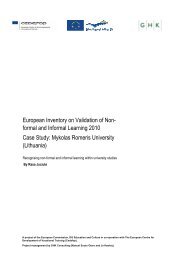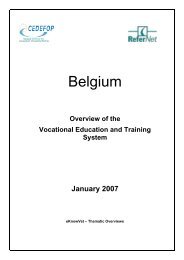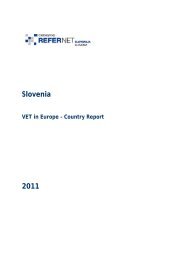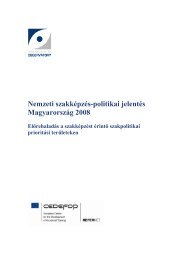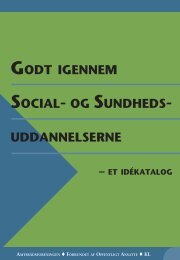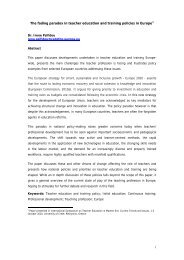PROFF – Professionalisation of VET teachers for the future - Europa
PROFF – Professionalisation of VET teachers for the future - Europa
PROFF – Professionalisation of VET teachers for the future - Europa
Create successful ePaper yourself
Turn your PDF publications into a flip-book with our unique Google optimized e-Paper software.
through practical experience. In some cases a more transparent salary and career system mightalso make a useful contribution.<strong>Pr<strong>of</strong>essionalisation</strong> <strong>of</strong> <strong>VET</strong> <strong>teachers</strong> <strong>for</strong> <strong>the</strong> <strong>future</strong>Organisational changes:teamwork, projectorganisation, etc.IT developmentNew target groups,changing target grouppr<strong>of</strong>ilesNational legislation:re<strong>for</strong>ms and changingpolitical priorities<strong>VET</strong> <strong>teachers</strong>new teacher roles,new competencerequirementsFrom teaching tolearning: student-centredapproachesInternationalisationLabour marketdevelopmentChanging paradigmswithineducational <strong>the</strong>ories2.2. MethodologyThe Helsinki workshop pointed to <strong>the</strong> need to identify good practices.Given this goal <strong>PROFF</strong> decided to base its investigation on a series <strong>of</strong> case studies. The goal<strong>of</strong> <strong>the</strong> individual case studies was to describe a training programme providing in-servicetraining to <strong>VET</strong> personnel and responding to (at least some <strong>of</strong>) <strong>the</strong> challenges identified by <strong>the</strong>project. The programmes to be investigated could be local, regional or national in scope andcould include both <strong>for</strong>mal and in<strong>for</strong>mal training activities.Each national TTnet was asked to identify four or five programmes which satisfied <strong>the</strong>secriteria. To ensure <strong>the</strong> ‘standardisation’ <strong>of</strong> data collection, <strong>the</strong> project coordinators created astandardised questionnaire and explanatory notes. The national TTnets <strong>the</strong>n used <strong>the</strong>se toolsto collect a series <strong>of</strong> preliminary data, which <strong>the</strong>y submitted to <strong>the</strong> project <strong>for</strong> evaluation. By<strong>the</strong> end <strong>of</strong> October 2002, 21 cases had been submitted.At <strong>the</strong> end <strong>of</strong> January 2003, <strong>PROFF</strong> selected 10 <strong>of</strong> <strong>the</strong>se cases <strong>for</strong> analysis. The key selectioncriteria were:• innovation: <strong>the</strong> degree to which <strong>the</strong> programme provided a genuinely novel approach tocritical issues in teacher and trainer training;• impact: <strong>the</strong> extent to which programmes were already influencing <strong>VET</strong> practice in <strong>the</strong>countries where <strong>the</strong>y were originally implemented;15



